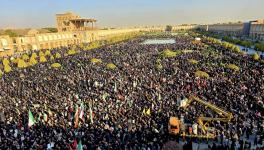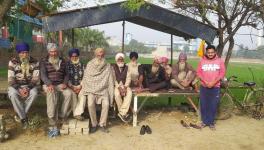Workers Join Farmers’ Protest at Delhi-Jaipur Highway, Caravan Stopped at Haryana Border
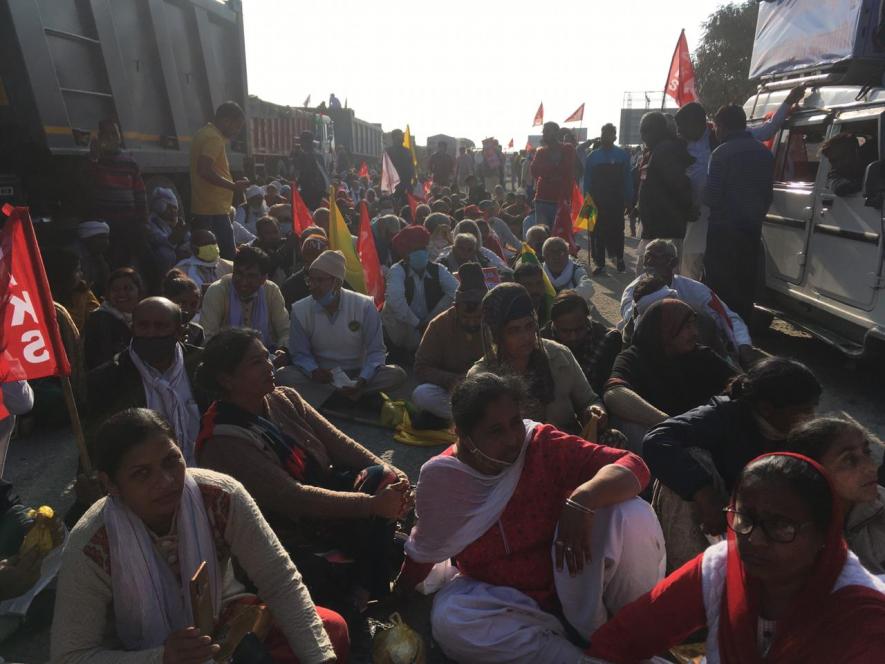
Protesters, mainly women, staying put at one carriageway of Delhi-Jaipur highway at Rajasthan-Haryana border. Image clicked by Ronak Chhabra
Shahjahanpur/Alwar: “Hum yahan pakka morcha lagane aaye hai [We are here to stay put for long].”
Passions and tempers flew high here at the interstate border of Rajasthan and Haryana, amidst a flurry of red flags on Sunday afternoon, as these words were let out by the protesters who had turned up at the call to “block” the Delhi-Jaipur national highway. The call had been given by Samyukt Kisan Morcha, an umbrella farmers’ body that is coordinating the ongoing nationwide stir against the controversial farm laws.
While bringing the traffic movement on both carriageways of the expressway stretch, also known as NH-8, to a halt still proved to be too difficult to achieve, nearly 200 protesters -- farmers mainly hailing from Rajasthan and south Haryana -- resorted to staging a dharna on one side of the road. Traffic on this side, indeed came to a halt. On the other side, after a brief stop, it was allowed in the evening.
Claiming that it will be joined by “more who oppose the kaale kanoon (black laws)” in days to come, the protesters here, however, said that they had “no intention of blocking the road” in the first place. It is actually the Haryana police that had “stopped” their march to the national capital.
“We started from our villages to march to Delhi and stage protests in Jantar Mantar. However, we have been stopped here by the Haryana Police,” says 40-year-old Sukhjeet Singh from Rajasthan’s Sri Ganganagar district. “If that is how they want it, then be it so. We will stay here only and won’t move till those sitting in Delhi accept our demands.”
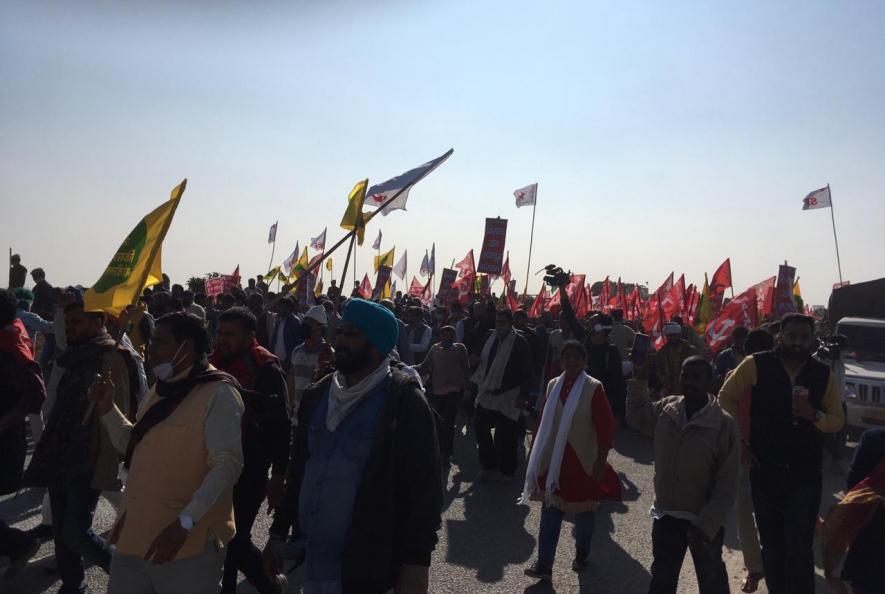
Protesters march towards the national capital at Delhi-Jaipur highway. Image clicked by Ronak Chhabra
The state border is indeed sealed -- with yellow barricades, boulders, kerb stones, JCB tractor, and truck containers. The multi-layered barriers are further protected by the state police personnel, accompanied by RAF, CISF, anti-riot vehicles, and water cannons.
Facing them are the protesters, who unlike their comrades from Punjab and Haryana, decided not to put the barriers aside, ostensibly in a bid to avoid the escalation of tensions.
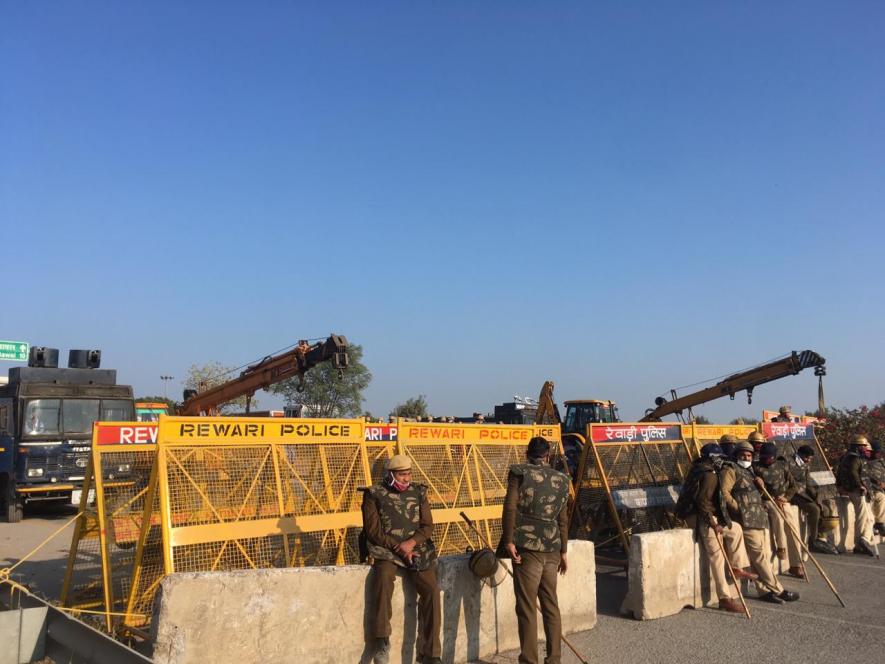
The state borders were sealed by Haryana police. Image clicked by Ronak Chhabra
“Mostly, the farmers here are from Rajasthan -- from Sikar, Jhunjhunu, Nagaur, and Hanumangarh. But they are also joined by those from Hisar, Rewari and Mahendragarh district in Haryana,” informed Satbir Dudi, 51, a farmer leader in Hisar.
Also read: Farmers' Protest: All Roads Lead to Democracy
Amra Ram, the CPI-M leader from Rajasthan, added that more are set to join them from other parts of the state. “The central government is telling that the protests are only being staged by farmers from Punjab and Haryana. That’s not true.”
Speaking about the low turnout today, he said, “The organisations in Rajasthan didn’t have much time to prepare because of the panchayat elections they have just got over”.
Balwan Poonia, another CPI-M leader from Rajasthan, spoke to NewsClick over phone, confirming from somewhere near Kotputli that he is “leading another caravan of farmers who shall join those at the Rajasthan-Haryana borders by tonight”.
Apart from the farmers, Anganwadi workers, women organisations, construction workers, etc. were also seen participating in large numbers today -- which also explains the presence of a large number of women. Usha Rani, national president, All India Federation of Anganwadi Workers and Helpers, told NewsClick that the Anganwadis from the state of Punjab and Haryana have been playing a crucial part in the farmers’ protest since September. “When the farmers came to Delhi, we joined them in their struggle. We have stayed at Singhu, Tikri, and other protest areas,” Rani, hailing from Khanauri region in Punjab saids.
According to her, the Haryana-Rajasthan border protest site will see more participation from the Anganwadi workers and helpers from both Haryana and Punjab, as “their participation is needed more over here”. There are nearly 27,000 Anganwadi workers and helpers only in Punjab.
But why are the workers who are otherwise themselves protesting against the Centre for their set of demands, are joining the farmers? “Well, my father was a farmer and my husband is a farmer,” Sukhwant Kaur, 52, an Anganwadi worker from Sangrur, said. “The government pays us too little and that is not enough to keep the home fires burning. We need a sustainable income from farming. Are we asking too much?”
Kaur further informed NewsClick that 1,000 trolleys from Punjab, with farmers and other protesters, are coming here at this protest site.
Thousands of farmers are already camping at least at four interstate entry-exit points to the city – Singhu, Tikri, Chilla and Ghazipur – connecting Delhi to Ambala in North, Hisar in Southwest, Noida in Southeast and Ghaziabad in East respectively.
Gurmukh Singh, 31, who had come from Tikri border protest site with five others also claimed that more people from the already set up border protests will come here. “We will lay siege around Delhi from all the points. The farmers from Punjab and Haryana will help in doing so.”
Sukhbir Singh, 36, from Hisar told NewsClick that the protesters will prepare in the coming days to stay put for a long period. “Our villages - in Mahendragarh and Hisar - are nearby only, some 5-10kms away. We will prepare food from there and get it here. In the coming days, we may also start preparing food here only.” Singh, the national president of Construction Worker Federation of India (CWFI) told NewsClick.
“Aaj toh bas pakka morcha lagana tha; aage ki sab taiyaari hum sab mil kar dekh lenge. (We just wanted to set up a long-term camp here. We will take care of the further preparations.)”
Protesters have gathered from the many industrial towns situated on the highway stretch that connects Delhi to Jaipur via Gurugram. While Rewari’s Bawal industrial town is hardly 10 km away; Rajasthan’s Neemrana is not farther than 20 kms away from the site. “In the coming days from these areas, we are expecting to see a good participation from the industrial workers. Already in solidarity of the farmers, many protest programmes had been arranged in the past by workers’ unions in the industrial towns,”' Satbir Singh, a CITU leader in Haryana, present today at the protest site, told NewsClick.
Waris Ali, 28, an informal worker from Hanumangarh in Rajasthan who had come today said: “The policies of the Modi government are nothing but anti-worker and anti-farmer. In such a scenario, we must fight together.”
Imrat Lal, 65, an agricultural worker associated with the All India Krishak Khet Mazdoor Sangathan talked about his participation in the protest today. “I am still required to work in the fields of other farmers at my age. My son is unemployed right now since he lost his job in the lockdown. My house is running from what I make -- some Rs. 260/280 per day. If the corporates now are going to take over the land of the farmers, then where will I work?”
The protest here was addressed today by leaders from Punjab, Haryana, Rajasthan, West Bengal, Telnagana, Maharashtra, Gujarat, among others.
Hannan Mollah, general secretary, AIKS said that the ongoing protests are “historic” as nearly 500 farmers organisations have come together with active participation in many years.
Speaking about the discussions with the Centre, he said: “The government didn’t take up even one of our agenda. It remained hell bent in pushing the amendments, while we kept demanding repealing of the laws.”
Medha Patkar, co-convenor, NAPM, said: “We are today here as satyagrahis. And today’s truth is this only… the farmers’ subsistence is being threatened by the corporate houses and their greed.”
Upholding the Centre’s recent written proposal, which the farmers’ collective had rejected recently, she said that this document is the proof that the Centre agrees that they had committed “lots of mistakes” with the farm laws.
Also read:Paddy Prices Have Crashed Below MSP in Many States
Get the latest reports & analysis with people's perspective on Protests, movements & deep analytical videos, discussions of the current affairs in your Telegram app. Subscribe to NewsClick's Telegram channel & get Real-Time updates on stories, as they get published on our website.









